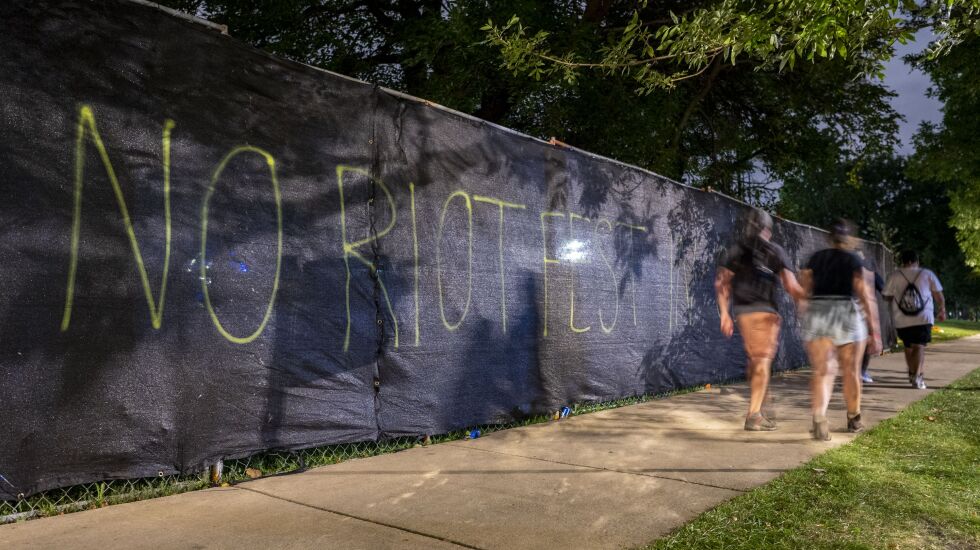
Now that the public use of Grant Park has been drastically curtailed by various private intrusions — NASCAR, the many festivals that charge admission — the opposition to privatization of public land may be reaching critical mass.
Here in Lawndale, the community around Douglass Park has been fighting for seven years to reclaim our park from the private for-profit mega-festivals that take it over each summer and fall.
All the complaints being made regarding the closing off of Grant Park to the public are equally if not more poignant in Lawndale. This is an issue that should unite the worlds of the haves and the have-nots in a common complaint and goal: Healthy, sane city life requires adequate natural space as well as space for outdoor recreation, no matter which neighborhood you live in.
SEND LETTERS TO: letters@suntimes.com. We want to hear from our readers. To be considered for publication, letters must include your full name, your neighborhood or hometown and a phone number for verification purposes. Letters should be a maximum of approximately 350 words.
The current trend of viewing public space as a means to generate revenue must be reversed. Public parkland was not put here to make money, it was established as part of the grand plan of the city to ensure the health and well-being of the inhabitants.
Every park in Chicago is necessary, from the tiniest playlot to the grandest stretch of natural habitat — all the parks belong to all of us, we are free to enjoy any and all of them no matter what part of the city we live in.
Now that people who love Grant Park as a public park are reaching the breaking point, I hope their outrage will extend to all the parks in neighborhoods that are being abused by privatization.
Rebecca Wolfram, Lawndale
Time for City Council to step in to police racist cops
Thanks to Sun-Times reporter Tom Schuba for his shocking report on Chicago’s far-right cops. If harboring implied unconstitutional racist sentiments is not enough to get a cop fired, then expect bad outcome confrontations no end into the future, with $1 million out-of-court settlements to avoid even bigger outlays of taxpayer dollars prescribed by juries.
On grounds of morality alone, there is no acceptable reason far right “Three-Percenter” cops should be sworn officers. They taint the entire department. If rules don’t exist that outlaw such attitudes or beliefs, then Chicago’s City Council is asleep at the switch.
Chicago is on the cusp of picking a new mayor. Mayors set the tone in such cases. Sad to say, this hate group problem has been allowed to fester under Lori Lightfoot’s leadership as mayor.
Looking ahead, mayoral candidate Paul Vallas already has the backing of the Fraternal Order of Police.
Florida Gov. Ron DeSantis is known for his far-right, anti-democratic views. He is out to out-Trump in his quest for a presidential nomination. The FOP invited him to Illinois as its guest speaker recently. The implication is clear.
The unfortunate sentiments of the FOP leadership are the handwriting on the wall as to its abiding attitude on race. Having assiduously sought the FOP’s backing, what is to be said of Vallas’ candidacy, and what do these clues portend?
Everybody wants less crime, but no indictment will stick if the rules of constitutionality are flouted by cops over eager to clobber wrongdoers in ways tainted by racism.
In the heat of the moment where cop meets crook, racism can taint the entirety. Cops need to decide whether to be cops or be members of racist groups; the two are altogether incompatible as concerns fair enforcement of the law.
It’s time our City Council spoke up and nipped this deficiency in the bud.
Ted Z. Manuel, Hyde Park
Vaping settlement should be used to educate youth
Just two short months ago, we sang the praises of the Chicago City Council for cracking down on the vaping industry, a much needed move to combat rising rates of e-cigarette use among Chicago’s youth. And today we applaud the city for moving to further protect our children with its successful lawsuit against Juul. But this is not enough.
According to the Federal Trade Commission, e-cigarette companies spent $719.9 million on marketing in 2020. In addition to providing free samples and product discounts, they used this money to convince our children that vaping devices are a safer alternative to cigarettes.
They fail to mention that e-cigarettes contain highly addictive nicotine and cancer-causing chemicals that reach deep into lungs. They also don’t share that vaping can affect memory, concentration and self-control, particularly in developing brains. And while vaping among Chicago’s school-aged children has increased by 56% in the past five years, the industry’s market share continues to expand through offers of scholarships, event sponsorship and an increased social media presence.
So, with $23.8 million in Juul settlement funds, the city now has an unprecedented opportunity to set the record straight. The city and its Department of Public Health have led the country in pushing for policies that protect our children from the threats of tobacco and e-cigarettes.
But what they have lacked — until now — are the resources needed to complement these policies with the youth education and communications campaigns required to successfully counteract industry tactics.
Since 2021, the Illinois General Assembly has required that e-cigarettes and other vapor devices be included in comprehensive health education programs in all Illinois schools.
Unfortunately, they failed to allocate resources to support this change. Chicago now has an opportunity to not only make this a reality for Chicago schools but to do even more.
These new resources can make a huge difference. We urge the city to use these new dollars — derived from an unscrupulous industry — to invest in public health, to invest in Chicago’s youth and young adults, and to save lives.
Erica Salem, senior director of strategy, programs and policy, Respiratory Health Association







